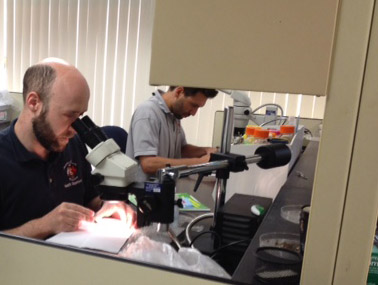The Health Department collects mosquitoes and ticks as part of routine monitoring activities. The data we get helps inform our program activities, including mosquito control and outreach messaging.
We trap hundreds of thousands of mosquitoes. From May to October, we set more than 4,000 traps throughout the county to collect mosquitoes. Mosquito samples, or pools, are tested at the Health Department Laboratory for West Nile and Zika.
We monitor mosquito breeding sites. We monitor mosquito "breeding sites" or larval habitats for evaluation and control purposes.
We collect and analyze ticks. We collect ticks and then test them for pathogens such as Lyme disease. Collected ticks are identified by species and life stage (larvae, nymph, or adult) before being sent to the Health Department laboratory for testing.
Read more about the Health Department’s mosquito and tick monitoring activities.
Human Case Monitoring
Human cases of mosquito- and tick-borne diseases are reported to the Health Department through passive and active monitoring activities, which are described in the Health Department's Communicable Disease Summary Report.
Vector-borne diseases commonly reported in Fairfax County include:
Other vector-borne diseases that are not commonly reported or may be identified in travelers returning from other states or countries where these diseases may occur include:
Whether you are traveling across Virginia, across the U.S. or internationally, take steps to protect your health when traveling. Pack to protect yourself against vector-borne diseases.
Mosquito Management
Mosquito management uses source reduction techniques and larvicides to control mosquitoes on public property. “Spraying” for adult mosquitoes is carried out only when circumstances warrant.
Proactive Mosquito Control
County-maintained stormwater dry ponds are routinely inspected by Health Department staff for mosquito breeding from April through October. These sites are treated with larvicides (insecticides that kill mosquitoes before they become flying adults) to control immature mosquitoes as needed. We also encourage county residents to eliminate mosquito larval habitats around their homes, in their communities and neighborhoods.
Reactive Mosquito Control
Routine surveillance activities may indicate the need for additional mosquito control activities. If the risk of disease transmission to humans is high, the County coordinates larval and/or adult mosquito control measures in public areas as necessary. The Health Department does not spray for nuisance mosquitoes. Only under exceptional circumstances will the Health Department spray insecticides to control adult mosquitoes, and in these rare cases, the spray will target only those mosquitoes that transmit disease to humans. All products used by our program are registered for such use by the U.S. Environmental Protection Agency.
Community Outreach and Education
We are out in the community all year long, educating people about protecting themselves against vector-borne illnesses. Want one of our insect biologists to visit your school? Need education materials? A table at your next event? Let us know how we can get involved.
 Fairfax County Health Department’s Disease Carrying Insects Program works to lower the threat of diseases spread by mosquitoes and ticks. The program uses an integrated approach to pest management that includes active monitoring, control measures, and public outreach and education to help protect county residents. Learn more about the work we do and how we can help you.
Fairfax County Health Department’s Disease Carrying Insects Program works to lower the threat of diseases spread by mosquitoes and ticks. The program uses an integrated approach to pest management that includes active monitoring, control measures, and public outreach and education to help protect county residents. Learn more about the work we do and how we can help you.
